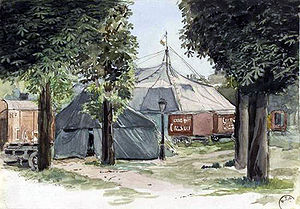Difference between revisions of "Cirque Cassuli"
From Circopedia
| Line 1: | Line 1: | ||
The French equestrian Joseph Cassuli created the Cirque Cassuli in the nineteenth century, before the advent of the Second Empire (1852-1870). It lasted for nearly a century, closing in 1937. During all that time, the Cirque Cassuli maintained a good reputation in the French provinces, especially in the south of France, where it often toured under the title ''Cirque National Corse'', since Cassuli was, like the Bonapartes, a Corsican. | The French equestrian Joseph Cassuli created the Cirque Cassuli in the nineteenth century, before the advent of the Second Empire (1852-1870). It lasted for nearly a century, closing in 1937. During all that time, the Cirque Cassuli maintained a good reputation in the French provinces, especially in the south of France, where it often toured under the title ''Cirque National Corse'', since Cassuli was, like the Bonapartes, a Corsican. | ||
| − | [[File:Cirque_Cassuli.jpeg|thumb|right| | + | [[File:Cirque_Cassuli.jpeg|thumb|right|300px|Cirque Cassuli (c.1925)]]Joseph Cassuli died in 1852 from injuries sustained after a bad fall during a performance, and the circus was taken over by his son, Joseph II, along with his father in law, a Mr. Delaume. Business was good during the Second Empire period, and the Cirque Cassuli built a strong audience following. Then came the War of 1870 between France and Prussia, during which Delaume, who served as a Major in the French Cavalry, was killed. The circus had to cease its activities for the duration. |
The circus was revived after the war, and resumed its travels. Paul Cassuli (1862-1937), the son of Joseph II, succeeded his father in 1891, and ran the circus in association with the equestrian [[Eugène Vasserot]], who became his son-in-law. As it often happened in family circuses, numerous members of the Vasserot family worked at a time or another with the Cirque Cassuli—which gave its performances a pleasant family atmosphere. | The circus was revived after the war, and resumed its travels. Paul Cassuli (1862-1937), the son of Joseph II, succeeded his father in 1891, and ran the circus in association with the equestrian [[Eugène Vasserot]], who became his son-in-law. As it often happened in family circuses, numerous members of the Vasserot family worked at a time or another with the Cirque Cassuli—which gave its performances a pleasant family atmosphere. | ||
Revision as of 23:10, 20 September 2011
The French equestrian Joseph Cassuli created the Cirque Cassuli in the nineteenth century, before the advent of the Second Empire (1852-1870). It lasted for nearly a century, closing in 1937. During all that time, the Cirque Cassuli maintained a good reputation in the French provinces, especially in the south of France, where it often toured under the title Cirque National Corse, since Cassuli was, like the Bonapartes, a Corsican.
Joseph Cassuli died in 1852 from injuries sustained after a bad fall during a performance, and the circus was taken over by his son, Joseph II, along with his father in law, a Mr. Delaume. Business was good during the Second Empire period, and the Cirque Cassuli built a strong audience following. Then came the War of 1870 between France and Prussia, during which Delaume, who served as a Major in the French Cavalry, was killed. The circus had to cease its activities for the duration.The circus was revived after the war, and resumed its travels. Paul Cassuli (1862-1937), the son of Joseph II, succeeded his father in 1891, and ran the circus in association with the equestrian Eugène Vasserot, who became his son-in-law. As it often happened in family circuses, numerous members of the Vasserot family worked at a time or another with the Cirque Cassuli—which gave its performances a pleasant family atmosphere.
In the 1920s, the Cirque Cassuli played Paris regularly during seasonal fairs. They exhibited a collection of small animals (monkeys, porcupine, foxes, eagles, etc.)—sometimes independently from the circus, as an extra income—and their stables contained about ten horses and a group of ponies. The circus eventually established its winter quarters at Epinay-sur-Seine, a Paris suburb, and was subsequently often seen in the Paris region.
Paul Cassuli sold his circus in 1929, but he didn’t stay idle for a long time: In 1930, a new Grand Cirque National Corse hit the road, still managed in partnership with Eugène Vasserot. Sadly, the popular Cirque Cassuli ceased to exist after the death of Paul Cassuli, on May 26, 1937.
Source
Adrian, Sur les Chemins des Grands Cirques Voyageurs (Bourg-la-Reine, Paul Adrian Edit., 1959)

